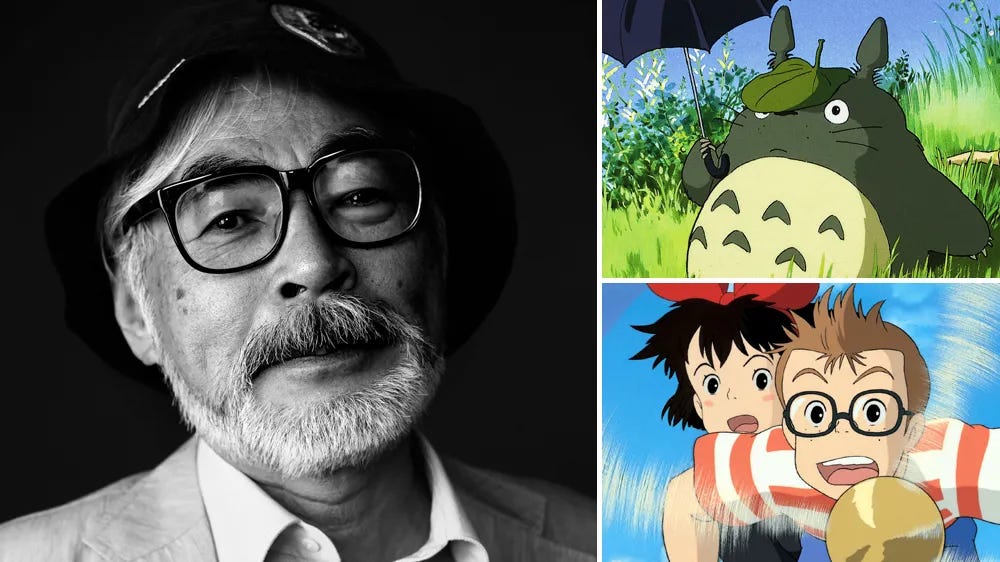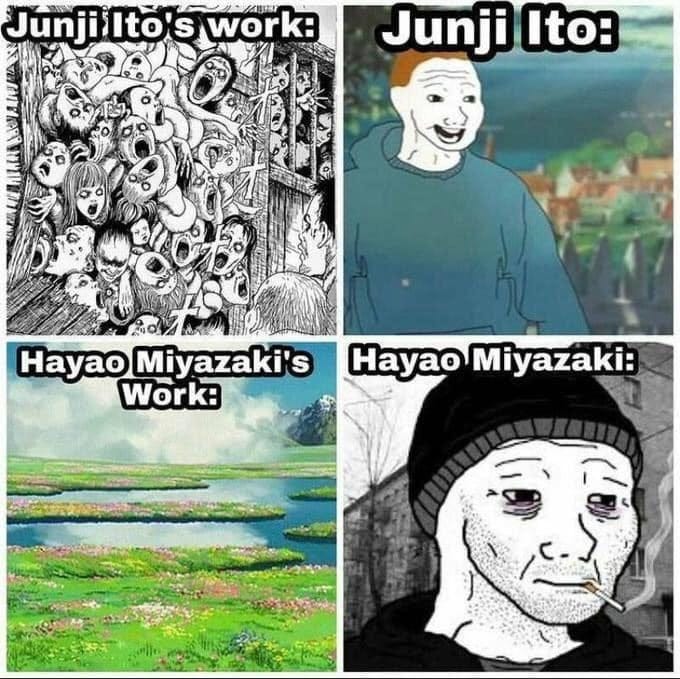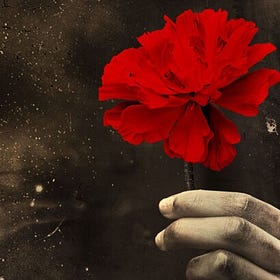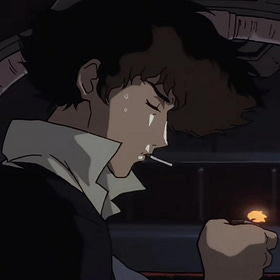“Airplanes are Beautiful, Cursed Dreams.”
Hayao Miyazaki. A man whose reputation in cinema as one of the founders of the renowned Studio Ghibli and director of a filmography of masterpieces proceeds him. An enormous influence on me personally and countless others, both philosophically and artistically. Miyazaki is a living legend who I, and many others, could write on and on about for good reason. If you are not familiar with Miyazaki, stop what you are doing right now and, for starters, go watch Kiki’s Delivery Service, a serious contender, in my personal view of the world, for the single greatest film of all time.
But Miyazaki is a real person, and so there is a deeply layered truth to who the man is that offers a very important lesson for both us storytellers and ordinary folk.
To bring a ton of anime history down to an effective, brief summary, Miyazaki’s reputation in the late ‘90s and early 2000s–when his presence was first felt like a meteor strike across the world–was manufactured. Yes, he is a genius, but his godhood image, an almost Uncle Walt (Disney) of Anime façade, was curated by executives in Japan and the U.S., such as Studio Ghibli’s distributor at the time: Disney, the House of Mouse itself. Thus, as a boy, I saw him solely in that light for I was too young to look any deeper.
By the time I was a teenager, which was when Disney parted from Ghibli, reality about who Miyazaki really was became public knowledge. The truth was a little hard to take at first. When I wrote my review for Miyazaki’s last picture, The Boy and the Heron, I summarized this truth, based on my years of familiarity with and study of the man’s career, as such:
For Miyazaki, in all my years of research, is a good man; an honorable one who sticks to his noble convictions. If for nothing else, he is painfully self-aware of what he truly is. Yet, hidden by the Ghibli and Disney marketing machine when the studio became big in the United States, the man is so fair and foul, too. His toxic perfectionism; his hypocrisy, or at least unjust paradoxes; his harsh treatment of his son, Ghibli director Goro Miyazaki; the severe work abuses he puts his animators through; the list of his mistakes goes on and on.
Miyazaki always struck me as a man who hates the fact that he is human, which I sympathize with. I admire that he works his damndest to make positive, if brutally honest, pictures. However, the irony that Princess Mononoke’s themes stand against the very practices that got the film made is very difficult to ignore. The man continues, to this very day, to work on anime films but endlessly bemoans how much anime is awful and his career was a mistake. He once said he would love to see Studio Ghibli burn to the ground. For better or worse, I am not accusing the man of anything he has not already said before about himself, and without pride, too.
To put the matter in another way, I refer to this very accurate meme comparing Miyazaki with another living legend, Junji Ito, the renowned horror mangaka:
This contrast is not difficult to spot, but it can be difficult to understand.
“It’s Over. Everything’s Over. The Forest is Dead.”
If one reads any of Miyazaki’s writings, like his reflections on his career in the biographies Starting Point and Turning Point, or watches unfiltered footage of the man, they will find him, in between drags of his cigarettes, complaining. A lot. About a lot of things, both serious and inconsequential. As a child born smack-dab in the middle of World War II, the man has long nurtured a disapproval of this flawed world with its many heinous people, ideals, and common cruelties. This anger is seen no better than in Miyazaki’s Princess Mononoke, one of the most influential films upon me. In short, this film tells the story of two sympathetic groups of people in conflict with each other, trying to survive a world that threatens to destroy them, leading to an apocalypse unlike any ever seen on film. (Put a pin on this topic for later).
Hate permeates nearly every shot of this unbearably gorgeous achievement of animators. (To his credit, Miyazaki, unlike ole’ Uncle Walt, actually drew frames for most of his films). Princess Mononoke is violent; brutal; and suffocating in its panic and fury over a world that, though filled with beauty and good people, indulgently propels itself forward into catastrophe as only the beast called man could cause. The great video essayist, “Bennet the Sage,” on his show, Anime Abandon, accurately characterized Princess Mononoke as Miyazaki letting loose all his wrath over how bad this world is and continues to be, as only a former-idealist can.
Trust me, I get where Miyazaki is coming from.
The filmmaker’s agonized wrath is blatant throughout his filmography. The bombings and pro-war insanity in Howl’s Moving Castle as criticism of El Presidente Bush’s bombings in the Middle-East, (critiqued also in Green Day’s song, “Holiday”). His anti-fascist critiques in Porco Rosso. His fear that Earth herself will burn up thanks to man in the action-packed Naussica of the Valley of the Wind from 1984 or the innocent Ponyo from 2008. Even his screenplay for Whisper of the Heart carries a serious concern for young people and their futures that stems from his worry over what world children will inherit; a fear that feels, frankly, straight from Holden Caulfield of J.D. Salinger’s The Catcher in the Rye.
People hate and kill each other; decimate their planet, their only home; openly and proudly lie; think nothing of themselves; and no matter what happens or what anyone does, they deliberately choose not to change, hiding behind some proclaimed crap about how beautiful free will is. Miyazaki and I cannot ignore these truths and we cannot change them. So we wallow in our rage against the dying of goodness that maybe was never there to begin with.
Except this fact, much like Miyazaki’s unpleasant nature as a leader, is not the whole truth for either of us, wherein lies hope.
“Nothing is Over. The Two of Us Are Still Alive.”
Despite his worthy but exhausting chagrin against the world in ways great and small, Miyazaki is, undeniably, one of the most enchanting filmmakers in all the world. From Lupin III: The Castle of Cagliostro, Future Boy Conan, the early episodes of Sherlock Hound, My Neighbor Totoro, Laputa: Castle in the Sky (in my imagination, the only rival against Raiders of the Lost Ark as the greatest adventure film of all time), to Spirited Away. . . there are no other films or series that feel like those directed by Miyazaki.
These works are sublimely gorgeous to behold. The sound effects are stand out. The music, often composed by the Joe Hisaishi, is transportive. These films are fun, playful, exciting, and watching them feels like being lost in a world that was always waiting for you. The characters are likeable and deal with struggles we can all relate to: the yearning for self-acceptance, the noble difficulty in pursuing heroism, or the fight against incomprehensible fear when you are just so small.
Moreso, within these fanciful stories lie great, timeless morals. The need for us to accept love over our inherent lusts for power in order for us all to survive, just to name one. His darker stories are filled with this same affectionate tone and atmosphere, such as the odd-but-true romance between Sophie and Howl in Howl’s Moving Castle. Miyazaki’s last two films, 2013’s The Wind Rises and 2023’s The Boy and the Heron, have distinguishable elements of the man reflecting on his own career. Instead of defending his hypocritical actions, he seems to lay them bare and judge them poorly, offering answers to his ways but not excuses; a progressive statement from the filmmaker.
Put simply, despite Miyazaki’s inherent darkness, his films are filled with hope. Indeed, Princess Mononoke does not end with the end of everything, but with rebirth. One more real chance for a better world. A hope that is born out of love, not hate.
“Kiki, look! It’s me!”
Why is Miyazaki so cynical, yet his films are undeniably comfort cinema—positively life-changing stories that continue to make people smile and encourage them to be better humans? Miyazaki himself gives us the answer:
“I'm not going to make movies that tell children, ‘You should despair and run away.’”
Another statement of his:
“I would like to make a film to tell children, "It's good to be alive.’"
His films certainly follow these declarations.
Without compromising on reflecting truthfully what the real world is like, Miyazaki has chosen to make sure even his darkest tales are filled with warmth and hope. They are each piercingly beautiful to watch. Instead of dragging everyone else down with him or criticizing any sense of hope, Miyazaki continues to choose the harder mindset: to be optimistic despite everything about reality telling him otherwise. Instead of devastating films that offer nothing but upset hearts, Miyazaki’s stories are filled with friendly forest spirits, wondrous airplanes, comical pirates, brave girls and boys, and a sense there are still good people in this world.
As a testament to Miyazaki and his fellow filmmakers’ genius, during 2020, amongst the lockdowns, I re-watched all of Studio Ghibli’s filmography up to that point. For, regardless of their often heavy nature that can leave me in unhappy tears, (I am looking at you, Pom Poko), these are stories that, more often than not, leave me in tears of joy. (Again, if you are finishing this article and have not ever seen Kiki’s Delivery Service, why are you not following my prior advice?). They comfort, inspire, and warm this weary heart of mine. They are special treats that I can never get enough of. Heck, my long-standing project, Cosmos, first began with the working title, The Sci-Fi Film Studio Ghibli Never Made, and I took early inspiration from the Miyazaki-directed music video, “On Your Mark”: another glorious piece of animation.
Despite his personal despair and flawed nature, by choosing to reflect optimism and hope in his work, Miyazaki has, in a small but undeniable way that will be nurtured and endure throughout the years long after he is gone, helped make the better world he dreams about. Imagine what you and I can do if we choose to do the same with the way we tell our stories. We can carry on the legacy of hope for a brighter tomorrow, despite all odds. What a wonderful world that can be.
Looking for a community of creative professionals who are dedicated to telling the better story of tomorrow? One Brilliant Arc is the story studio for you! Our story coaches are here to walk with you along your journey to making a real impact—because whether you are building a book, a film, a brand, or a business, your honest, human voice is the key.
Book a (free!) consult call today and let’s get your story a game plan!
More related storytelling lessons:
Why Let Stories Rip Our Souls Apart?
Storytellers are uniquely gifted and sensitive souls whose work often takes everything out of them. This is why we keep writing, and also how storytellers will change the world.







